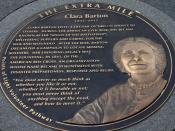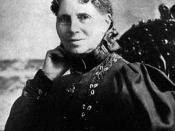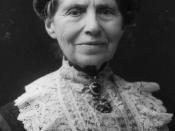Angel of the Battlefield: The Life of Clara Barton written by Ishbel Ross gives a very in depth look into the world of the woman who perhaps revolutionized medical care in America's times of need. Mr.Ross states that to Clara Barton's own avowal she would rather "stand behind the lines of artillery at Antietam, or cross the pontoon bridge under fire at Fredricksburg"ÃÂ than preside at a public function, make a speech, or cope with a committee, all of which she did with outward calm despite her feelings.
The feelings that Clara had stemmed from the fact that she was a shy and timid child. As she grew up, she was taught about the soldiers and the aspects of war by her father who was a captain in the army. This caused Clara to call him her "soldier father."ÃÂ Stephen Barton instilled in his daughter the values of being a hard worker and helping others.
When she was younger, her daddy shared war stories with her and taught her military etiquette, this while other little girls were learning fairy tales and nursery rhymes. In her family, she was the youngest of five children and she received a great education due to this fact. All of her older siblings taught her what they had learned in school and Clara was a well-rounded individual for this reason.
Clara dealt firsthand with nursing skills when her brother David was badly injured while he was helping to build a barn . She waited on him consistently for nearly two years, giving him medications and applying the leeches prescribed by the doctors. She also read to him, but the gloom was too much. Clara felt that she was nursing a "sleepless, nervous, cold dyspeptic"ÃÂ. Finally, she was released from this duty.
Despite her knack of caring for the ill, Clara's first occupation was as a schoolteacher. This job came due to the fact that it was a family tradition. Later, she directed disaster relief for the Red Cross and distributed medical supplies with the help of Samuel Ramsey, the surgeon general at the time. During the war, she worked to spread the idea of the Red Cross. At this time, the Red Cross was not well known in America and Miss Barton felt that it would be very beneficial for those who needed the help and care, to receive it from individuals who were qualified and skilled to administer it.
When she told Major D.H. Rucker, Assistant Quartermaster General in charge of transportation, about her efforts he immediately ceased what he was doing and wrote out her permit to go to the front. Clara worked very hard to obtain all of the necessary passes from the various government departments, from the surgeon general and from the Military Governor of the District of Columbia, as well as from Major Rucker. Finally, the last of the red tape had been cut and she was on her way to the front.
Within just a few months after Fort Sumter fell and the Civil War began, Clara Barton was known as the "Angel of the Battlefield"ÃÂ, and this is how she was introduced to the American public. The fact that she was well schooled in military operations helped Clara to prepare herself for action. She stated that the men she attended to on the battlefield were "ragged, bloody, draggled men who said everything but their prayers"ÃÂ. Miss Barton was one of the first women to supply the troops with food and comforts. This was the beginning of her extraordinary service record during the war. She always tried to view each soldier as an individual and not part of a mass army. Clara felt that it was important to be concerned with each life individually and the whole group separately. Nursing on the battlefields was generally unheard of anyway until Florence Nightingale of England took that step and entered a battlefield with medical supplies. Many women followed suit, but Miss Barton was more than just that. She was usually at the battlefield to care for the first soldier that was hit and did not leave until the last of the wounded was cared for.
General William H. Sears of Kansas said, "I think that Clara Barton has shown by her distinguished services and achievements that she is the greatest of all women in this country, as measured by her services to soldiers in war."ÃÂ By the end of the war, Clara caught the news of the Red Cross in Europe and set out to attempt to incorporate it in the United States of America. Clara along with Dr. Henry W. Bellows attempted to bring the United States into the Red Cross Convention of Geneva. Dr. Bellows failed at this task that later would be accomplished by Miss Barton.
With the announcement of the Franco-Prussian War, Clara was stirred and enlightened by the practical uses of a national Red Cross and she stated that whether she lived or died across the sea was not as important as the help that she could give others who were injured or worse. Miss Barton was in such a rush to arrive in Haguenau that she accidentally left the International Red Cross flag and insignia behind. It was at this point that she took the red ribbon from around her neck and fashioned it into a cross that she sewed onto her sleeve. This makeshift device served its purpose and her name has been associated with this symbol ever since that day. However, instead of going to Haguenau where the battle was Clara was put in Brumath, which is where all of the casualties were taken.
Clara was very displeased with this and decided to set out on foot to the front. On her way there, she passed a night in Vandenheim, where four thousand soldiers were camped. Her evening there was one that she felt was more difficult than all of her combined operations in the Civil War. Clara's interest in the Red Cross was stirred further by what she saw in the German military hospitals that she toured on the invitation of Grand Duchess Louise of Baden. Clara and the Duchess had many conversations on the subject of the Red Cross and soon, the two women were helping each other on both sides of the front lines.
The work that she did and the things that she learned caused her to prepare and circulate a brochure entitled "The Red Cross of the Geneva Convention: What It Is"ÃÂ. Clara went in and out of offices seeking interviews and trying to make her cause known. Eventually, Miss Barton had Richard W. Thompson, the Secetary of the Navy in tears after he read her documents and listened to her eloquent speech. President Rutherford B. Hayes became interested in Clara's cause and supported her in her work. Finally, Clara Barton succeeded in her conquest and the United States was added to the Geneva Convention. Susan B. Anthony, was hot on Miss Barton's trail by this time and wanted to join the efforts. Susan wanted to make Clara an ally and an advocate. By the end of her life, the American Red Cross had become a known fixture in America with people eager to volunteer for the cause.
These are the reasons, among many others, listed in this book that show how Clara Barton became the "Angel of the Battlefield"ÃÂ and revolutionized medical care in America's times of need.


